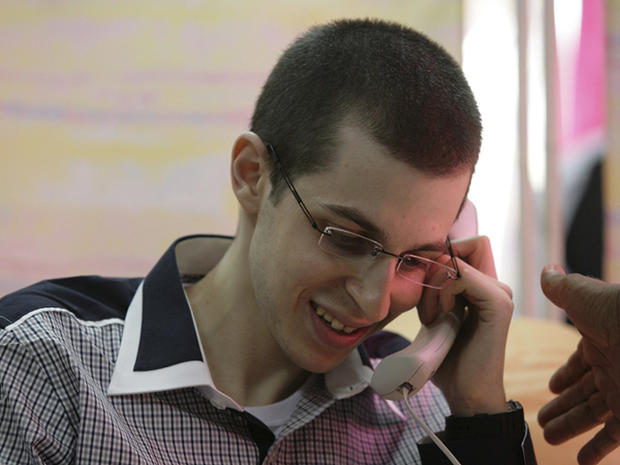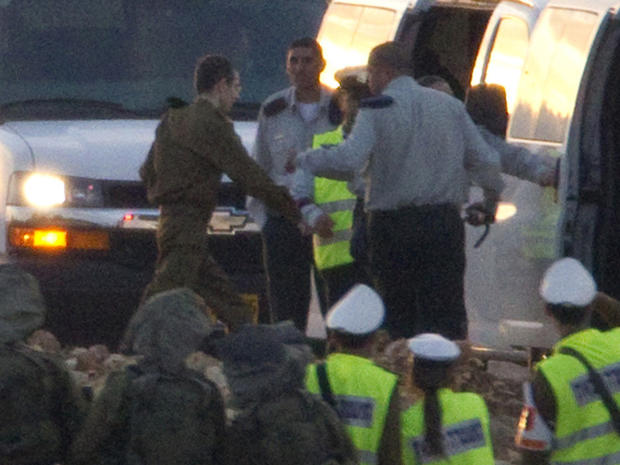Schalit free in Israel-Palestinian prisoner swap
TEL NOF AIR BASE, Israel - Looking thin, weary and dazed, Israeli soldier Gilad Schalit emerged from more than five years in Hamas captivity on Tuesday, surrounded by Gaza militants with black face masks and green headbands who handed him over to Egyptian mediators in an exchange for 1,000 Palestinian prisoners. After a medical examination, Israeli officials said Schalit showed signs of malnutrition.
More than 450 Palestinians were transferred from Israeli prisons to the West Bank and Gaza, where massive celebratory rallies festooned with green Hamas flags were held. In Gaza City, tens of thousands crammed into an open lot where a huge stage was set up, decorated with a mural depicting Schalit's capture in a June 2006 raid on an army base near the Gaza border. The crowd exhorted militants to seize more soldiers for future swaps.
The rest of the prisoners -- about 550 more -- are to be released in a second phase in two months.
CBS News correspondent Mark Phillips reported that to Hamas, the militant Palestinian group which controls Gaza, the prisoner swap deal is being portrayed as a great victory by a lopsided score: 1,027 to 1.
Mass rallies celebrate freed Palestinians
Netanyahu issues warning to freed Palestinians
Before he was flown to an Israel air base where he reunited with his parents, Schalit spoke to Egyptian TV in an interview Israeli officials later called "shocking." The gaunt, sallow and uncomfortable looking Schalit appeared to struggle to speak at times, and his breathing was noticeably labored as he awkwardly answered questions.
Still he said he felt good and was "very excited" to be going free. But the circumstances of his release, along with the awkward TV interview, raised questions about the conditions the 25-year-old had endured.
After a tumultuous day that included a reception with the prime minister and an emotional reunion with his family, Schalit touched down in his hometown of Mitzpe Hila in northern Israel late Tuesday on board a military helicopter.
Thousands of people jammed the streets and stood on rooftops to celebrate Schalit's return. The ecstatic crowd sang songs, waved Israeli flags, popped champagne bottles, embraced and cheered him on. A smiling Schalit briefly waved to the crowd before ducking into his family's house. Police blocked access to the street to give the family privacy.
Schalit, who had not been seen in public since his capture, was whisked across Gaza's border into Egypt early in the morning by armed Hamas militants in an SUV, setting the swap into motion.
Wearing a black baseball hat and gray shirt, he was seen for the first time emerging from a pickup truck and turned over to Egyptian mediators by a gang of top Hamas militants, some with their faces covered in black masks with the green headband of the Qassam brigades -- Hamas' military wing. Among those around Schalit in those first moments was Ahmed Jabari, the shadowy head of Hamas' militant wing, one of Israel's most wanted militants.
Schalit, still escorted by Hamas gunmen, was then taken to a border crossing, where an Egyptian TV crew waited to interview him before he was finally sent into Israel.
Stumbling over his words, he spoke in the interview of missing his family and friends, said he feared he would remain in captivity "many more years" and worried that the deal might fall through after learning about it last week.
"Of course I missed my family. I missed friends, meeting people to talk to people, and not to sit all day, to do the same things," he said.
In one picture taken of the interview, a Hamas gunman with black face mask and green headband of the Hamas military brigade could be seen lurking in the background.
Israeli officials reacted angrily to the interview, saying it was inappropriate to force Schalit to answer questions in such difficult circumstances. But the interviewer, Shahira Amin, said he had not been coerced.
Later, video released by the Israeli military showed the weak Schalit being helped into an army jeep after crossing the border into Israel, and walking gingerly down some steps as he exited a military caravan after changing into a fresh army uniform. Military officials said a physical exam had found him to be in "good" condition, though he showed signs of malnutrition and lack of exposure to the sun.
Schalit was then flown to an air base in central Israel, where he was hugged by Prime Minister Benjamin Netanyahu and Israel's military chief, Lt. Gen. Benny Gantz, and reunited with his family. Video footage showed Schalit's father, Noam, hugging and kissing his son, before saying "come see your mother" and leading him away for a family reunion.
Speaking afterward, Netanyahu said he understood the pain of Israeli families who lost relatives in Palestinian violence, but that Israel's ethos of doing everything possible to bring its soldiers home safely forced him to act.
He also issued a staunch warning to the freed militants.
"We will continue to fight terror and every released terrorist who returns to terror will be held accountable," he said.
Those concerns were underscored with comments by Palestinian prisoners and demonstrators for more soldier kidnappings to bring home the thousands of Palestinians who remain in Israeli prisons.
"The people want a new Gilad," the crowd chanted in Gaza.
Hamas agreed to release Schalit in exchange for 1,027 Palestinian prisoners, many of them serving life sentences for deadly attacks on Israelis.
Included among the prisoners is: Abdel Aziz Salha, who helped kill two Israeli soldiers who made a wrong turn on the West Bank and were stabbed to death; Nasser Yateima, who planned a 2002 hotel bombing that killed 30 people celebrating Passover; and Awana Jawad Mona, who seduced a sixteen year old Israeli boy over the internet to come meet her. That boy, Ofir Rahum, was shot and killed when he arrived.
Some 477 were set free on Tuesday, with the remainder to be released in two months. To address Israeli security concerns, Hamas agreed to have some 200 prisoners originally from the West Bank to be deported to the fenced-in Gaza Strip instead. Some 40 others were deported from the area altogether, sent to Jordan, Qatar, Syria and Turkey.
Hamas, which negotiated Tuesday's swap, has controlled Gaza since capturing the territory from forces loyal to Palestinian President Mahmoud Abbas in 2007.
Hamas turned Tuesday's celebration in Gaza into a show of strength for the Islamic militant movement.
Thousands hoisted green Hamas flags, while a far smaller number raised the banners of rival movement Fatah, led by Abbas. The released prisoners were making their way from the border with Egypt, on the southern edge of the Gaza Strip, to Gaza City in the north, and many thousands were lining the street to cheer on the convoy.
In the West Bank, Abbas addressed a crowd of several thousand, including released prisoners and their relatives. In an attempt at unity, he shared a stage with three Hamas leaders in the West Bank and at one point, the four men raised clasped hands in triumph.
Still, Abbas is likely to suffer politically as a result of the swap, the most significant for the Palestinians in nearly three decades. Over years of negotiating with Israel, Abbas has only been able to bring about the release of those who had little time left on their sentences.
While Israel has a long history of lopsided prisoner swaps, Tuesday's deal was by far the most lopsided. It capped a five-and-a-half-year saga that has seen multiple Israeli military offensives in Gaza, an Israeli blockade on the territory and numerous rounds of failed negotiations.
The Israelis also portrayed the swap as a victory.
"After a five-year nightmare held in medieval conditions, and with no access to the Red Cross, ... Schalit will finally be home today," said Marcus Sheff, head of The Israel Project's Jerusalem office. "Israeli society's commitment to Schalit's safe return has not wavered; Nor has Israel's obligation to protect its citizens from terrorism"
Kehrman's daughter Tal was 17 when she was killed in a bus bombing along with sixteen others. The attack's organizers are among those being freed.
"The government of Israeli government has made the memory of my daughter cheaper," Kehrmann said.
An intense media campaign to free Schalit made him a national symbol in Israel, and all local radio and TV stations held special live broadcasts Tuesday, following every step of the exchange. The voices of Israeli broadcasters cracked with emotion as news of his return became clear.
Israel and Hamas have held numerous rounds of talks through German and Egyptian mediators. But officials on both sides have said that conditions prompted in part by the recent Egyptian revolution helped drive them to an agreement. Both sides have been eager to have good ties with the new Egyptian leadership.
News of the deal was welcomed by the U.S., Britain, France and Germany, among others. Schalit holds French citizenship, while a German mediator was closely involved in the years of negotiations.
U.S. Secretary of State Hillary Rodham Clinton, speaking while on a stop in Tripoli, Libya, Tuesday, said the U.S. was pleased the ordeal was over.
"He was held for far too long in captivity," Clinton said.


